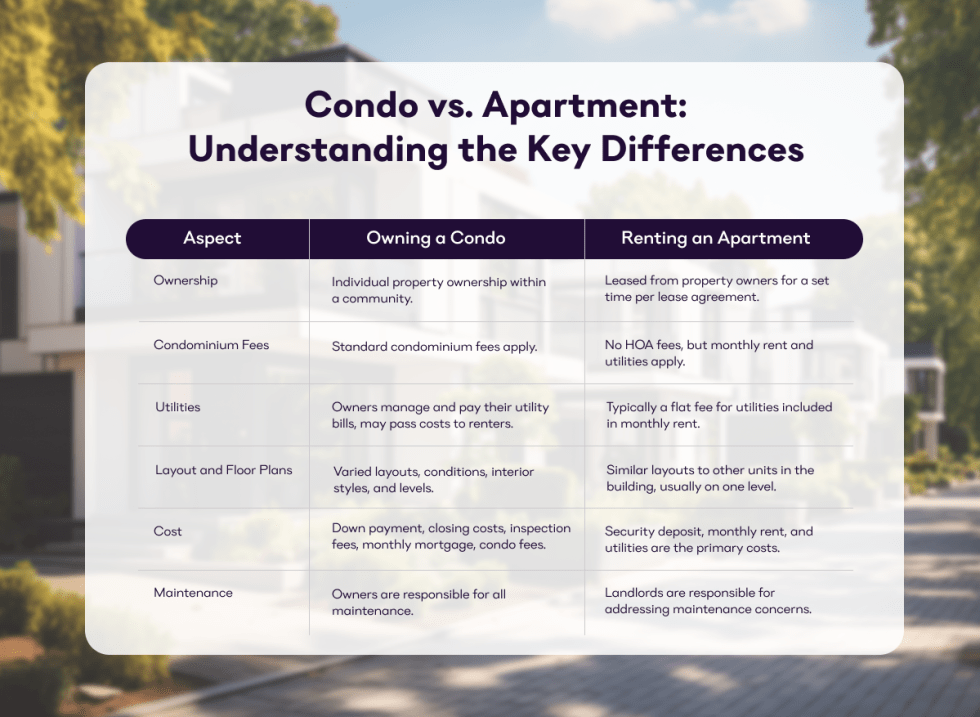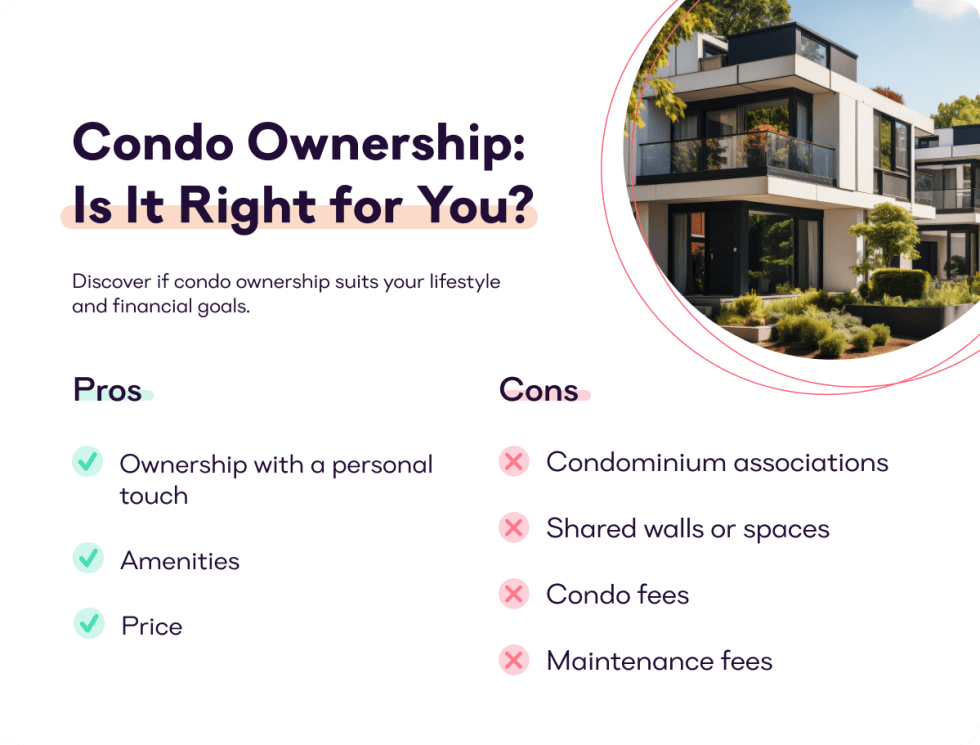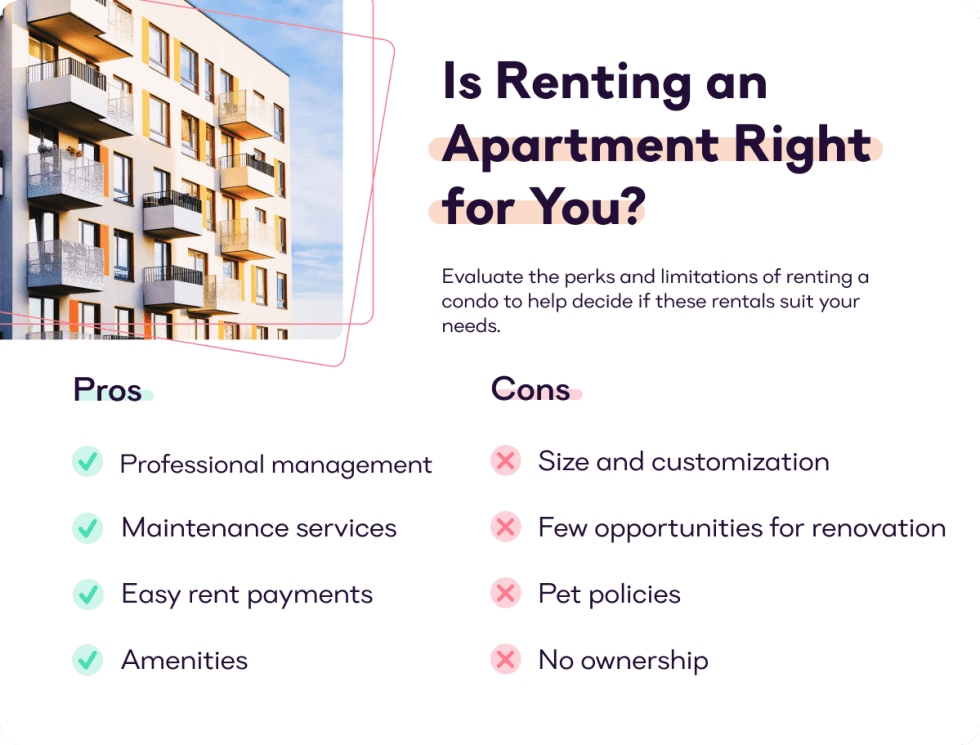Condo vs. Apartment: How to Choose [2024 Guide]

If you're drawn to condos, you probably want an affordable way to own your own place, and you're wondering if the deal is really better than what apartments have to offer. Understanding the main differences can help you make a decision, particularly if you're choosing between renting or buying for the first time.
Both apartments and condos are great choices. But with apartment rent at an annual low, choosing between the two requires discernment. You have to take into account differences in ownership, management, amenities, maintenance, rules, and costs. There are pros and cons to each, which you should consider before making a decision.
Condos vs. Apartments
What’s the Difference Between Condos vs. Apartments?
The main difference between an apartment and a condo is who has ownership. A condo is a private unit owned by an individual in a complex with similar units. Each unit is probably owned by someone different. However, they probably all pay condominium fees to the same property manager in order to enjoy amenities like landscaping or package pick up. They are often, though not always, arranged as townhomes.
In most cases, apartments are all owned by one property manager, and each individual pays rent to that owner. In some cases, apartments can be bought. Apartments that you can purchase are generally units within large buildings in metropolitan areas or luxury units.

What's the Difference Between a Condo and an Apartment if You're a Renter?
If you're a prospective renter, there's not much difference betweeen a condo and apartment. In reality, condo owners frequently take on a landlord role and rent out their units. When renting in a residential building with condos, the person who owns the unit is your landlord. Meanwhile, apartment buildings offer numerous rentals under the same management or ownership.
What's the Difference Between a Condo and an Apartment if You're a Buyer?
At first glance, you may not notice the difference between a condo and an apartment building, and many people assume they can only buy condominiums. Apartments are often for sale as well, which you may find by visiting the websites of prospective apartment buildings or complexes.
Condominiums tend to have fees associated with them for upkeep and security of shared spaces. Apartments may or may not have additional fees associated with shared spaces. You can inquire about fees when you ask for a quote.
Owning a Condo vs. Renting an Apartment
There are key differences between owning a condo vs. renting an apartment. Here are a few factors to consider.
- Ownership: Condos are individual pieces of property owned by an individual within a larger residential community. Renters lease apartments from property owners for a set amount of time established in a lease agreement.
- Condominium Fees: Condominium fees are standards with condominiums, and You don’t need to pay HOA fees when renting an apartment. However, leasing an apartment still entails monthly rent payments and utility payments.
- Utilities: Condo owners typically manage their own utility bills themselves and then pass on the cost to their renters. Renters can expect a flat fee for utilities included in their monthly rent.
- Layout and Floor Plans: Apartments usually have similar layouts to every other unit in the building. They are also usually on one level. This standard isn’t necessarily the case for condominiums, as each unit within a residential condo building may vary widely in condition, interior style, and number of levels.
- Cost: As a renter, your costs are typically your deposit and monthly rent. In a condo, you will have a down payment, closing costs, inspection fees, a monthly mortgage, and condo fees.
- Maintenance: Renters can report maintenance concerns to their landlord, who is responsible for addressing them. You will be solely responsible for maintenance concerns in a condo.
- Amenities: Condos and apartment buildings are often built with similar structures, meaning most amenities are likely to be the same.
- Location: Similar to amenities, apartment buildings, and condos have the same structure and are, therefore, often found in comparable locations.

Is a Condo Bigger Than an Apartment?
Condos tend to be larger than apartments, as they often more resemble a townhouse or house than a traditional apartment. Not all condos are bigger than all apartments, however. There are plenty of sizable apartments out there.
Pros and Cons of Owning a Condo
Now that you understand the main difference between an apartment and a condo and the ownership structure involved, let’s look at the pros and cons of condo living.
What Are the Benefits of Owning a Condo?
- Ownership with a Personal Touch: Although there are always exceptions, most condos are in terrific shape. Owners usually invest more into kitchen upgrades, interiors, and upkeep inside their own condos than in an apartment complex.
- Amenities: Condominiums often come with updated, shared amenities. While you’re condo hunting, look for a concierge, pool, parking spots, sports facility, or outdoor space.
- Price: It’s a common misconception that renting a condo is more expensive than renting an apartment. Condos are often more cost-efficient with flat utility fees and waived add-ons like HOA fees.
Interested in a first-hand account of condo living? Check out this great video from Brittany Morgan, who reflects on her purchase and occupation of a condo (and her thoughts for prospective investors):
What are the Disadvantages of Owning a Condo?
- Condominium Associations: If you have a condominium association that imposes a lot of rules or fines, it may impact your experience of ownership. A great condo association can be fantastic, though.
- Shared Walls or Spaces: Condominiums are generally a better value for first-time home owners because they are part of larger buildings, meaning they are less private and independent than most houses.
- Condo Fees: Double-check your agreement to determine how much you will have to pay in condo fees.
- Maintenance Fees: In addition to condo fees, you will have to pay for repairs to your unit (including interior, plumbing, electricity, etc.).
Pros and Cons of Renting an Apartment
Now that you understand the pros and cons of condo living, it’s time to look at the other side of the coin. Here are the pros and cons of renting an apartment.
What are the Benefits of Renting an Apartment?
- Professional Management: Under the care of corporate apartment management, you can expect streamlined trash pickup and other services. Handling complaints and repairs require a specific process, such as filling out a maintenance request through the proper channels.
- Maintenance Services: Maintenance services are typically available around the clock in an apartment complex. If anything is wrong with your appliances, the resolution is a phone call away.
- Easy Rent Payments: Apartment complexes typically offer online portals for rent payments. With easy online access, paying your monthly rent is quick and easy.
- Amenities: Apartment communities typically have amenities such as shared laundry rooms, gyms, or outdoor pools. Upscale, luxurious apartment buildings may even boast tennis courts or a doorman.
What are the Disadvantages of Renting an Apartment?
- Size and Customization: Apartments tend to be smaller than condos and other rentals. You won’t have much choice about the appliances and layout of your space.
- Fewer Opportunities for Renovation: You can’t renovate the kitchen or replace appliances or HVAC features when renting an apartment. The property managers are responsible for replacing any appliances and other systems and will choose something suitable for the building’s budget.
- Pet Policies: If you’re renting with pets, an apartment might not be ideal, depending on the size and needs of your furry friend. Many multifamily apartment communities also restrict dogs by breed, weight, and size.
- No Ownership: One of the main benefits of owning a condo is home ownership, which you do not have as a renter.

Shopping for Condos vs. Apartments
Condos available for sale in your area are generally listed with other houses on real estate listings and websites. As the owner of a condo, you'll go through essentially the same processes as any homeowner to acquire your new property.
On the other hand, if you’re looking for convenience and a straightforward rental agreement, an apartment might be the right choice for you.
Wanting to look at renting an apartment or condo? Start on the search for your next place by taking Apartment List's easy quiz to get matched within your location, price, and choice of amenities!
More FAQs about Condos vs. Apartments
Which is Better - a Condo or Apartment?
Both condos and apartments can be great choices depending on what you're looking for. It may also come down to the kind of deal you can get in your area. But the bottom line is that if you want maintenance, amenities, and better deals, go for apartments. For a great deal on property you can own as well as community amenities, try a condo.
Are Condos Quieter than Apartments?
Condos are sometimes built with more natural space in between, or with better distributed space, in order to increase privacy. This also makes them generally quieter than apartments. For instance, condos arranged as townhouses will often be naturally quieter than apartments surrounding by a unit on multiple sides.
Can You Hear Neighbors in a Condo?
Condominiums often share walls or floors with neighbors, so how well insulated and built your condo is will determine how much of your neighbors' activity you can hear. Even the most well-insulated condos may allow you to hear one another from time to time.
Can I Soundproof My Condo?
If you own your condo, you are probably allowed to soundproof it. Double-check with the condominium association about the requirements in order to get an idea of how much structural change you can make to your building.
Share this Article






